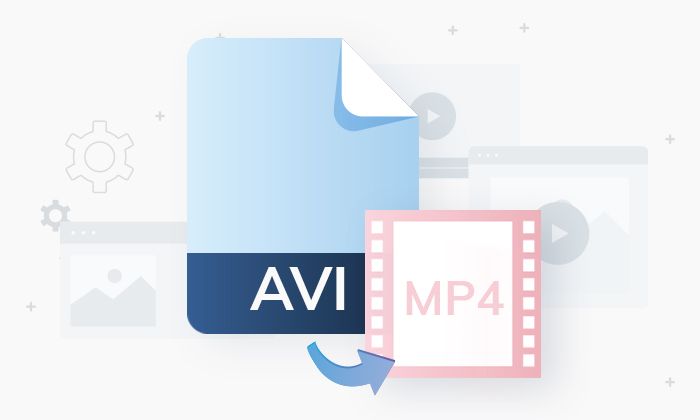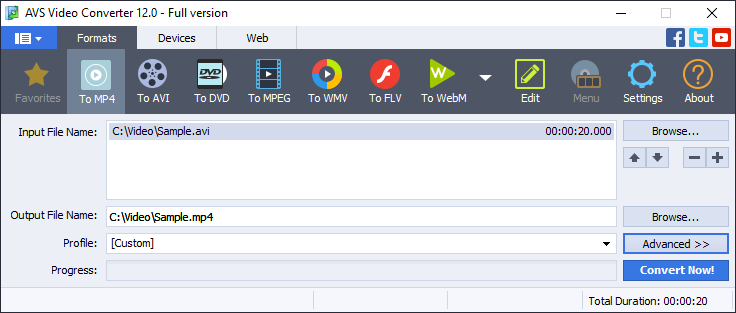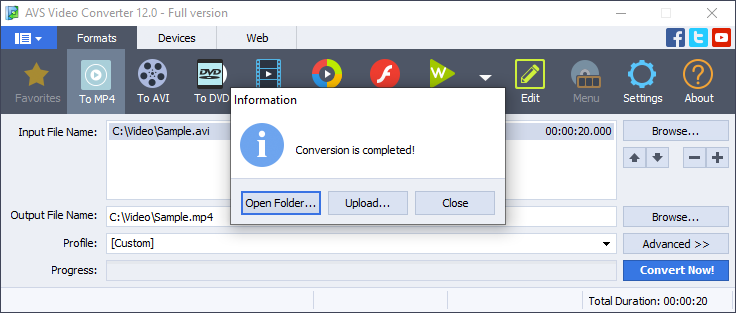
Multimedia world offers us so many video formats today that sometimes we need to get deeper and learn the particular pros and cons of each one. Today we’ll compare and convert perhaps the most influential formats in the last decades – AVI and MP4.
AVI (also Audio Video Interleave) is a proprietary container format that was dominant in the early 2000s. It is suitable for storing high-quality video and audio.
Facts about AVI
- Developed by Microsoft. AVI is a direct competitor of MOV – the container format by Apple.
- Heavyweight. As AVI uses little or no compression, the size of an output file may be measured in gigabytes.
- Outdated. In the middle of 2000s Microsoft developed AVI’s successor WMV that obtained support for 3D standard and streaming. Also, AVI doesn’t support attachments such as fonts for subtitles.
- Lots of codecs supported. This makes encoding an AVI file much easier and contributes to its compatibility.
- Lossless. That means your file will never lose quality and you don’t need any codecs to play it.
- Adaptable. It is supported by many video players, i.e. AVI can be opened on Windows and other operating systems with third-party apps.
MP4 (also MPEG-4 Part 14) is a patent encumbered container format that can contain videos, sound, images and subtitles.
Facts about MP4
- Compressed. MP4 reduces the file size that is important for transferring it. The quality remains as close to the original as possible.
- Compatible. MP4 supports any media player, browser, mobile devices – it is now difficult to think of what hardware doesn’t play this format.
- Good for streaming. In contrast to AVI, MP4 can be streamed over the TV/Internet.
- Supports images and subtitles. It makes MP4 more suitable for video editing.
AVI and MP4 in comparison
We can definitely say that MP4 is superior to AVI when it comes to compatibility with mobile devices and type of content:
AVI | MP4 | |
Streaming | No | Yes |
Windows | Yes | Yes |
Linux | Yes (with third-party players) | Yes |
MacOS | Yes (with third-party players) | Yes |
Microsoft devices | Yes | Yes |
Android | Partially | Yes |
Apple | No | Yes |
Attachments | No | Yes |
Images | No | Yes |
Subtitles | No | Yes |
3D | No | Yes (at video format level) |
Variable bit rate/frame rate | Yes | Yes |
Video codecs | Almost all | MPEG-2 Part 2, MPEG-4 ASP, H.264/MPEG-4 AVC, H.263, VC-1, Dirac, etc. |
Audio codecs | Almost all | MPEG-2/4 (HE)-AAC, MPEG-1/2 Layers I, II, III (MP3), AC-3, Apple Lossless, ALS, SLS, Vorbis, etc. |
These advantages make some users prefer MP4.
AVI to MP4 Converter

Follow several simple steps listed below to convert AVI into MP4 with AVS Video Converter.
- Choose a file to convert by clicking the upper Browse button.
- Customize output file name and its location by clicking the lower Browse button.
- Press To MP4 at the Formats tab of the main toolbar.
- Select a pre-defined MP4 Profile with suitable output video parameters. Choose between numerous configurations for particular devices and purposes.
- Open Conversion Options by pressing Advanced >> to customize the output video properties yourself and save it as a new profile. Please note that if you are new to video encoding, it is recommended to use pre-defined profiles to get a file of expected parameters.
- Click Convert now.
When conversion is completed the following window pops up:

The Open Folder… button helps you find the location of the converted file easily.
The Upload… button transfers the converted video to your gadget or digital storage devices.
You can also just close the pop-up by clicking Close and continue conversion of other videos.
Get free AVS Video Converter following the link below:
We hope this guide was useful to you. If you have any questions, please use the comment section below.